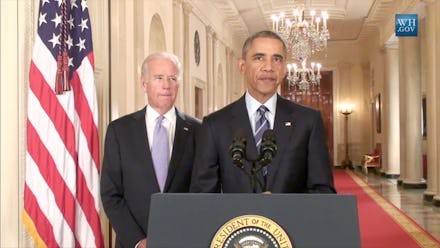The U.S. Finally Reached a Historic Deal with Iran. Here's Everything You Need to Know.

On Tuesday, Iran and six world superpowers, including the United States, finally arrived at the long-awaited nuclear deal with Iran, after more than a month of negotiations in Vienna.
"This deal meets every single one of the bottom lines" and proves "the world can do remarkable things," President Barack Obama said at an early morning national address Tuesday from the White House.
The terms of the nuclear deal bring an end to the 12-year embargo on Iran. The successful outcome also marks the cessation of hostilities between the U.S and Iran, since the American embassy in Tehran was stormed in 1979.
Under this deal, Iran will be prevented from enriching uranium and plutonium and required to give up the vast majority of its plutonium stockpile — the country currently has enough to make 10 nuclear weapons. The International Atomic Energy Agency will have access to an Iranian inspection whenever it chooses, making the deal one "built on verification" and "not on trust."
Obama noted not just on the historic nature of this diplomatic agreement but also the wider implications for the one of world's most volatile regions. It will likely prevent further military actions, he said, by preventing America from forcibly stopping the development of nuclear weapons or preventing an arms race among other Middle Eastern countries.
The biggest points of contention included lifting of the United Nations' missile sanctions and arms embargo, the rate at which the sanctions would be removed and the extent to which Iran would be allowed nuclear centrifuge research and development.
These sticking points were ultimately resolved. Initial details suggest the majority of the sanctions will be phased out over the next decade, while ensuring Iran is adhering to the terms along the way.
Butting heads: Congress will now have approximately 60 days to review and approve the deal, which Obama strongly encourage they approve, for the sake of national and international security. "I will veto any legislation which prevents the implementation of this deal," he said.
Members of the Republican Party and Israel have already expressed either disapproval or condemnation. Israeli Prime Minister Benjamin Netanyahu described the deal as a "historic mistake."
"Sweeping concessions were made in all of the areas meant to block Iran from the ability to arm itself with nuclear weapons," Netanyahu said in a statement, Bloomberg reports. "We have made a commitment to block Iran from arming itself with nuclear weapons, and that commitment stands."
Some in Congress also immediately expressed their concern over the deal.
President of Iran Hassan Rouhani, however, maintained such aggressive claims were misleading.
Under pressure: Negotiations between Iran and six of the world's superpowers — Britain, China, France, Germany, Russia and the United States — were far from fluid and saw two last-minute extensions from June 30 to July 9 as high-level diplomats scrambled to come up with an agreement which was acceptable to all parties.
Many diplomats left after the first extended deadline of July 7 was not met, but U.S. Secretary of State John Kerry and Iranian Foreign Minister Javad Zarif were among those to hold back in order to carry on the conversation.
The U.S. was under pressure from Congress to close the deal, while Iran was more lackadaisical about the deadline — some suggested they were using America's sense of urgency as a bargaining chip to get what they wanted. But for their part, given the economic benefit of having oil and trade sanctions lifted, Iran was also likely interested in closing a deal quickly.
If there were any doubts as to the tense nature of the negotiations, one need look no further than the snacks. During the five-week period, in which Iran and the world's superpowers wrestled to agree on a nuclear deal, United States diplomats consumed "10 pounds of Twizzlers ... 20 pounds of string cheese, 30 pounds of mixed nuts and dried fruit" and hundreds of Rice Krispies Treats, reports the Boston Globe. But, whatever it is they did (and ate), it worked.